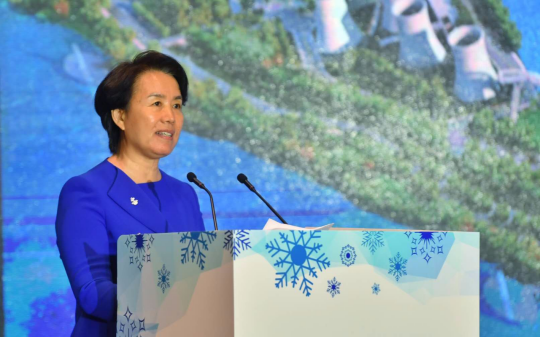Source:2021-05-01
As the first city to host both the Summer and Winter Olympics, Beijing has rich experience in inheriting and nurturing Olympic legacy, and is keen to share it with the world.
At the Olympic City Development Forum held on September 6, 2020 as part of the 2020 China International Fair for Trade in Services (CIFTIS), Han Zirong, full-time vice president and secretary general of Beijing Organising Committee for the 2022 Olympic and Paralympic Winter Games, gave a detailed account of the “Beijing experience” in dealing with Olympic legacy.

Han speaks at the forum.
11 venues for 2008 Beijing Summer Olympics to be used for 2022 Winter Olympics
“What the Olympics bequeath to the world are not only exciting contests and competitions but also abundant legacy. Venues are part of that,” Han said, revealing that 11 venues for 2008 Beijing Olympics will be used for the 2022 Winter Olympics following the principle of hosting green, open and clean Olympic winter games.
“The Ice Ribbon, the Bird’s Nest and the Water Cube will add radiance to each other as landmark architectural complexes in the city,” Han said.
Han also expounded on the influence of the Olympics on the city’s development: “The Olympics have driven faster subway building in Beijing. The city now has a rail system of 700 kilometers, serving more than 10 million passengers each day, and it is very convenient. The 450-hectare Olympic Forest Park is the ‘green lung’ on the central axis of the city, and also a fitness center for citizens.
Make plan for post-Olympic use of venues based on their unique conditions
Han disclosed a “one policy for one venue” principle for the building and operation of venues after taking into full consideration their functions during and after the Winter Olympics.
She disclosed that 34 sponsors had signed agreements, which she believed would enable them to earn greater reputation worldwide and accelerate their development.
Han said the committee was also enhancing efforts to implement the “Hi-tech Winter Olympics Action Plan” to speed up research and development of 5G communications, artificial intelligence, big data and other advanced technologies, design pilot application scenarioses and formulate standards and specifications to ensure a better experience at the 2022 Winter Olympics.
Winter Olympics-themed communities and iconic attractions
Han said that both Beijing and Zhangjiakou had launched a three-year plan for creating a barrier-free environment, under which a number of roads, information equipment and other public facilities will be built not only for the participants of the 2022 Paralympic Winter Games, but also for the convenience of all the disabled and the elderly.
Han also mentioned the building of the volunteer team for the 2022 Winter Olympics, saying that more than 850,000 volunteers had applied for participation from late 2019 to August 2020.
“Last year, China hosted the ‘Meet in Beijing’ International Arts Festival and a series of events to select designs for the slogan, torch and uniforms for the 2022 Winter Olympics.”
“We will also accelerate the building of the Beijing International Olympic Academy, and build a Winter Olympics museum in New Shougang High-end Industry Comprehensive Service Park (also known as Shougang Park). ”
Drive regional industrial development relying on Beijing-Zhangjiakou high-speed railway
From the perspective of the environment, the concept of environmental protection has penetrated all preparations for the Winter Olympics, Han said, adding that carbon dioxide refrigerants with the lowest emissions are being used, a cross-region green power trading mechanism had been adopted and all venues will use green energy.
In November 2019, the Committee’s sustainable management system received international certification.
In May 2020, the International Olympic Committee, the International Paralympic Committee and the Beijing Organising Committee for the 2022 Olympic and Paralympic Winter Games jointly released the Beijing 2022 Sustainability Plan, unveiling specific measures for post-Olympic ecological restoration at the zones where the Olympic events will be held, greening and landscaping in these zones, protection of forests, wetlands and biodiversity in these zones, with the aim of leaving long-lasting, eco-friendly Olympic legacy.
“In the next step, we will rely on the Beijing-Zhangjiakou high-speed railway and the Beijing-Chongli expressway to drive the development of sports, tourism and culture along these routes, and accelerate the building of the Beijing-Zhangjiakou sports, culture and tourism belt for the benefit of the people in these areas,” Han said.

© Copyright 2020. All rights reserved
Beijing Olympic City Development Association.All rights reserved.Beijing ICP 13521520 No.